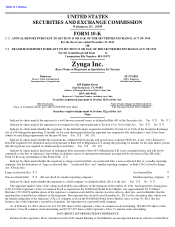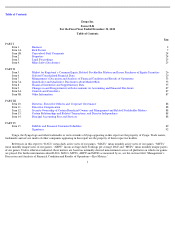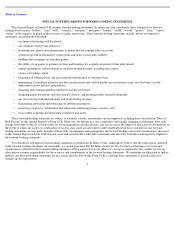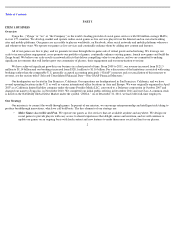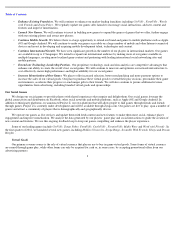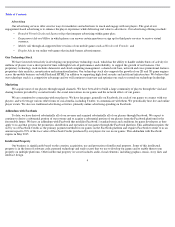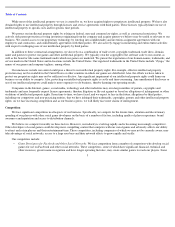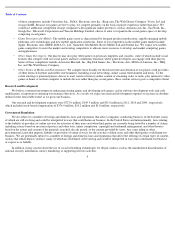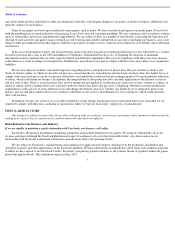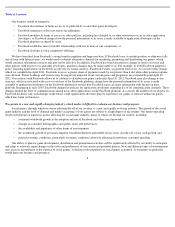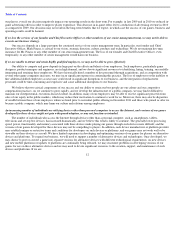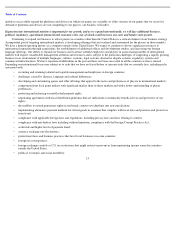Zynga 2011 Annual Report Download - page 10
Download and view the complete annual report
Please find page 10 of the 2011 Zynga annual report below. You can navigate through the pages in the report by either clicking on the pages listed below, or by using the keyword search tool below to find specific information within the annual report.
Table of Contents
Research and Development
We believe continued investment in enhancing existing games and developing new games, and in software development tools and code
modification, is important to attaining our strategic objectives. As a result, we expect research and development expenses to increase in absolute
dollars for the foreseeable future as we grow our business.
Our research and development expenses were $727.0 million, $149.5 million and $51.0 million in 2011, 2010 and 2009, respectively,
which included stock-based compensation of $374.9 million, $10.2 million and $1.8 million, respectively.
Government Regulation
We are subject to a number of foreign and domestic laws and regulations that affect companies conducting business on the Internet, many
of which are still evolving and could be interpreted in ways that could harm our business. In the United States and internationally, laws relating
to the liability of providers of online services for activities of their users and other third parties are currently being tested by a number of claims,
including actions based on invasion of privacy and other torts, unfair competition, copyright and trademark infringement, and other theories
based on the nature and content of the materials searched, the ads posted, or the content provided by users. Any court ruling or other
governmental action that imposes liability on providers of online services for the activities of their users and other third parties could harm our
business. We are potentially subject to a number of foreign and domestic laws and regulations that affect the offering of certain types of content,
such as that which depicts violence, many of which are ill defined, still evolving and could be interpreted in ways that could harm our business
or expose us to liability.
In addition, rising concern about the use of social networking technologies for illegal conduct, such as the unauthorized dissemination of
national security information, money laundering or supporting terrorist activities
6
of these competitors include Crowdstar, Inc., DeNA, Electronic Arts Inc., King.com, The Walt Disney Company, Vostu, Ltd. and
wooga GmbH. Because our games are free to play, we compete primarily on the basis of player experience rather than price. We
could face additional competition if large companies with significant online presences, such as Amazon.com, Inc., Facebook, Inc.,
Google Inc., Microsoft Corporation and Tencent Holdings Limited, choose to enter or expand in the social games space or develop
competing social games.
•
Game Developers for Mobile: The mobile game sector is characterized by frequent product introductions, rapidly emerging mobile
platforms, new technologies and new mobile application storefronts. Some of our competitors in the mobile game market include
Apple, Electronic Arts, GREE, DeNA Co. Ltd., Gameloft, Glu Mobile, Rovio Mobile Ltd and Storm8, Inc. We expect new mobile-
game competitors to enter the market and existing competitors to allocate more resources to develop and market competing games
and applications.
•
Other Game Developers: Our players may also play other games on personal computers and consoles, some of which include social
features that compete with our social games and have community functions where game developers can engage with their players.
Some of these competitors include Activision Blizzard, Inc., Big Fish Games, Inc., Electronic Arts, SEGA of America, Inc., THQ
Inc. and The Walt Disney Company.
•
Other Forms of Media and Entertainment: We compete more broadly for the leisure time and attention of our players with providers
of other forms of Internet and mobile entertainment, including social networking, online casual entertainment and music. To the
extent existing or potential players choose to read, watch or listen to online content or streaming video or radio, play interactive video
games at home or on their computer or mobile devices rather than play social games, these content services pose a competitive threat.


